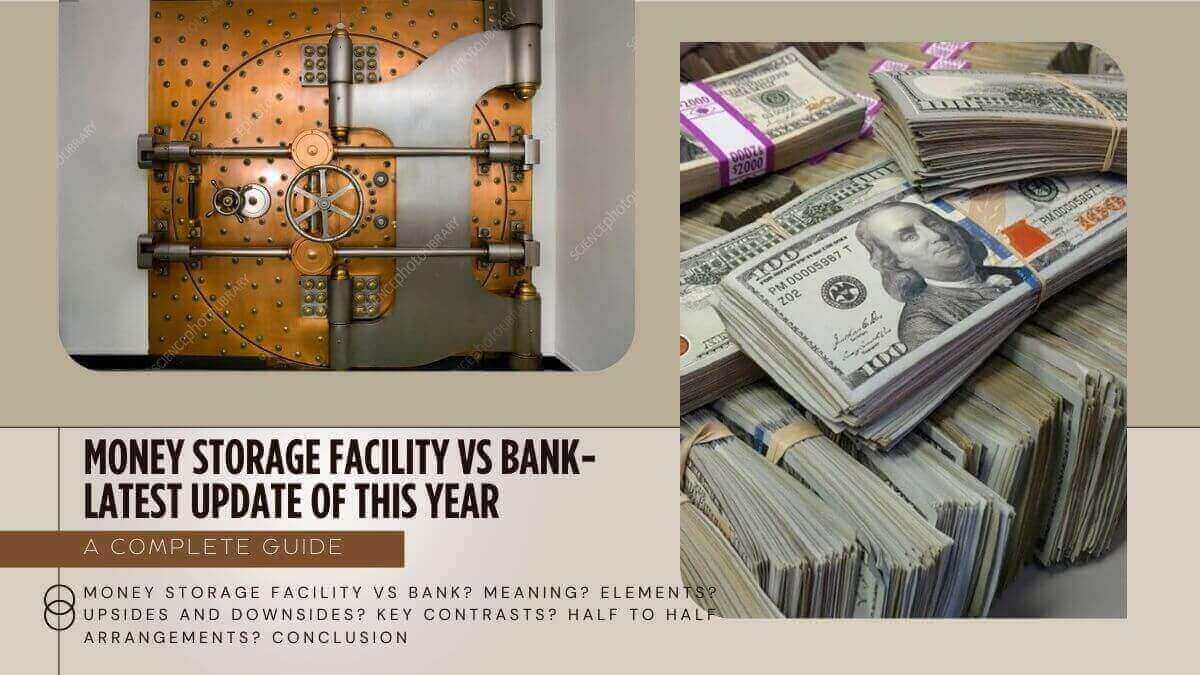With regards to dealing with your funds, choosing where to store your cash is a basic decision. Two well-known choices are conventional banks and cash storerooms. Each offers unmistakable benefits and downsides, and understanding these can assist you with settling on an educated choice in view of your exceptional requirements and conditions. In this extensive aid, we will investigate the distinctions between Money Storage Facility vs Bank, analyzing their highlights, advantages, and likely drawbacks.
MEANING OF MONEY STORAGE FACILITY VS BANK
A cash storage space, frequently alluded to as a money stockpiling administration, is where people and organizations can securely store cash or different resources. These offices give secure conditions, frequently with cutting-edge security frameworks, to safeguard your resources from burglary or misfortune.
ELEMENTS OF MONEY STORAGE FACILITY VS BANK
High Security: Cash storerooms commonly offer powerful safety efforts, including observation cameras, caution frameworks, and confined admittance to guarantee the well-being of put-away resources.
Adaptable Capacity Choices: Numerous offices give different capacity choices, including safe store boxes, vaults, and secure storage spaces. This adaptability permits clients to pick the arrangement that best meets their requirements.
Access Control: Clients ordinarily have command over who can get to their put-away things. This is especially favorable for organizations that might have to confine admittance to specific representatives.
Protection Choices: Numerous cash storage spaces offer protection choices for putting away things, giving extra inner harmony.
Upsides and downsides of Cash Storage spaces
Masters
Security: The high-level safety efforts set up can give you true serenity about the well-being of your money and resources.
Comfort for Money Stockpiling: For organizations or people who manage huge measures of money, cash storage spaces can provide a common arrangement without the requirement for a bank.
Access Control: You can figure out who approaches your put-away things, improving security.
Cons
Restricted Monetary Administrations: Cash storage spaces don’t offer customary financial administrations like advances, credit, or speculation potentially opening doors.
Cost: Putting away money or assets might include month-to-month charges, which can amass over the long haul.
Access Limits: Contingent upon the office, you might have restricted admittance to your cash, particularly beyond ordinary business hours.
Grasping Banks
What is a Bank?
A bank is a monetary organization that acknowledges stores from clients, gives credits, and offers a scope of monetary administrations. Banks assume a basic part in the economy by working with exchanges, giving credit, and offering different monetary items.
Highlights of Banks
Store Records: Banks offer various sorts of records, including checking, reserve funds, and testaments of the store (Compact discs), which can assist you with dealing with your cash successfully.
Admittance to Credit: Banks give advance items, like individual credits, home loans, and Mastercards, permitting clients to acquire cash for different requirements.
On the Web and Versatile Banking: Most banks offer on-the-web and portable financial administrations, giving simple admittance to account data, store moves, and bill installments.
Venture Administrations: Many banks likewise give speculation items and monetary warning administrations, assisting clients with developing their riches.
Upsides and Downsides of Banks
Geniuses
Assortment of Administrations: Banks offer an exhaustive set-up of monetary items, making them an all-in-one resource for your monetary necessities.
Premium Income: With reserve funds and financial records, you can acquire revenue on your stores, assisting your cash with developing over the long haul.
Advantageous Access: Banks frequently have different branches and ATMs, making it simple to get to your cash at whatever point you want it.
Cons
Expenses: Banks might charge different charges, including month-to-month upkeep expenses, ATM charges, and overdraft charges.
Lower Security for Money: While banks have safety efforts set up, keeping a lot of money in store can be less secure than utilizing a committed storage space.
Restricted Command Over Access: Dissimilar to cash storerooms, banks normally have explicit working hours, and you may not necessarily have prompt admittance to your assets.
Key Contrasts: Cash Storage space versus Bank
Understanding the critical contrasts between cash storage spaces and banks can assist you with figuring out which choice adjusts best to your monetary objectives.
- Reason
Cash Storeroom: Principally centered around safely putting away money and resources.
Bank: Offers a great many monetary administrations, including stores, credits, and speculations.
- Security
Cash Storeroom: Significant level safety efforts explicitly intended for resource insurance.
Bank: Sufficient security for reserves yet might be less reasonable for putting away a lot of money.
- Openness
Cash Storeroom: Restricted active times and access limitations might apply.
Bank: For the most part more available with numerous branches and web-based financial choices.
- Expenses
Cash Storage space: Month-to-month capacity charges and conceivable protection costs.
Bank: Different expenses rely upon the record type and administrations utilized.
- Monetary Development
Cash Storeroom: No premium income on putting away money.
Bank: Potential to procure revenue from stores and put resources into different monetary items.
When to Pick a Cash Storage Space
- High Money Volume
On the off chance that you are an entrepreneur or somebody who regularly manages a lot of money, a cash storage space might be the better choice for keeping your assets secure.
- Security Concerns
Assuming you have significant things that require upgraded security, for example, gems or significant records, a cash storeroom offers particular insurance.
- Restricted Need for Banking Administrations
On the off chance that you don’t need credits, credit, or other financial administrations, utilizing a cash storage space can give you the security you want without the extra intricacies of a ledger.
When to Pick a Bank
- Far-reaching Monetary Necessities
In the event that you require different monetary administrations, including financial records, credits, and speculation choices, a bank is a more reasonable decision.
- Procuring Interest
On the off chance that you believe your cash should work for you, keeping it in a bank permits you to procure revenue, causing your assets to develop over the long haul.
- Openness
Assuming you esteem the comfort of getting to your cash through ATMs, branches, and Internet banking, a bank offers a degree of openness that cash storerooms can’t coordinate.
Half and half Arrangements: Joining The two Choices
At times, a blend of both a cash storage space and a bank might be the best arrangement. The following are a couple of situations where this crossover approach could be helpful:
- Enhancing Resource Security
Involving a bank for everyday exchanges and reserve funds while putting away bigger measures of money or significant things in a cash storage space can give broadened security.
- Improved Security for High-Worth Resources
For those with huge interests in real money or assets, utilizing the two choices can augment security and openness.
- Adaptability in Monetary Administration
Having both a financial balance and admittance to a cash storage space offers adaptability, permitting you to deal with your funds in view of your ongoing necessities.
Going with the Best Decision for You
Survey What is happening
Prior to choosing a cash storeroom and a bank, find an opportunity to assess what is going on. Consider factors, for example,
How much money or resources do you want to store?
Your standard financial requirements (e.g., advances, credit).
How frequently do you want admittance to your assets?
Your solace level with safety efforts.
Exploration and Look at Choices
When you grasp your necessities, research different cash storage spaces and banks in your space. Look at highlights, expenses, and administrations to track down the best fit for your circumstance.
Talk with Monetary Counselors
On the off chance that you’re as yet unsure about which choice is best for you, consider talking with a monetary guide. They can give customized direction in light of your monetary objectives and conditions.
CONCLUSION
Picking either a cash storeroom or a bank is a significant choice that can essentially influence your monetary administration. While cash storage spaces offer high security and specific choices for money and resources, banks give an extensive scope of monetary administrations and helpful access.
At last, the best decision relies upon your singular requirements and conditions. Whether you choose one arrangement or a blend of both, understanding the advantages and impediments of each will engage you to make informed choices about your cash stockpiling and the board. Assess your monetary objectives today and pick the choice that best lines up with your requirements.






